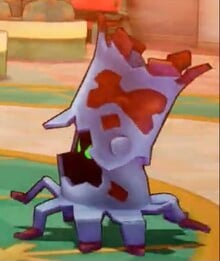Krode
| Krode | |||
|---|---|---|---|

| |||
| First appearance | Mario & Luigi: Brothership (2024) | ||
| Variant of | Treevil | ||
| |||
Krodes are metallic Treevils that appear in Mario & Luigi: Brothership, found only on Merrygo Island. They resemble corroded electrical conduits, having rusted "trunks", a hole on their front with green eyes, and eight legs. A stronger version of them called Krode R can be found later in the game, also inhabiting Merrygo Island, and there are also Glohm-infused versions. Their name is derived from "corrode" due to their shell's rusty appearance. Krodes can wander on the field like most other enemies, attacking Mario and Luigi with a pipe when they get too close.
Battle[edit]
Krodes have two attacks: one of them is spawning a pipe and then throwing it at the brother it is standing in front of; this can be countered by using a hammer.
A Krode may also spawn a wrecking ball and toss it at the Bros., which can be avoided by jumping. If it spins clockwise, it is aiming for Mario, and if it spins counterclockwise, it is aiming for Luigi.
Names in other languages[edit]
| Language | Name | Meaning | Notes |
|---|---|---|---|
| Japanese | マガラクタ[?] Magarakuta |
Portmanteau of「マガツリー」(Magatsurī, "Treevil") and「 |
|
| Chinese | 魔杂[?] Mózá |
- | |
| Dutch | Krode[?] | - | |
| French | Âmonceau[?] | Portmanteau of âme ("soul") and monceau ("heap") | |
| German | Rosterich[1] | From Rost ("rust") and "-rich" (masculine noun-deriving suffix) | |
| Italian | Spazzator[2] | From spazzatura ("trash"/"garbage") and the suffix for monster names "-or" | |
| Korean | 몬동사니[?] Mondongsani |
Portmanteau of "몬트리" (Monteuri, "Treevil") and "잡동사니" (japdongsani, "junk") | |
| Portuguese | Calamilixo[?] | - | |
| Spanish (NOA) | Corroto[?] | Portmanteau of corroer ("to corrode") and roto ("broken") | |
| Spanish (NOE) | Despantojo[3] | From espanto ("dread") and matojo ("bush") |
References[edit]
- ^ https://www.eurogamer.de/mario-luigi-brothership-komplettlosung-tipps-und-tricks?page=11
- ^ Mario & Luigi: Fraternauti alla carica - LIVE #3. By Mariuigi Khed on YouTube. Retrieved on November 19, 2024.
- ^ https://www.youtube.com/watch?v=Ija-qrJB8O0